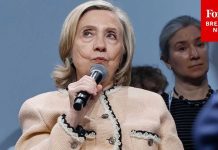
Over 100,000 Spaniards flooded Madrid streets demanding Prime Minister Pedro Sanchez’s resignation as corruption scandals engulf his administration, family members, and close associates in what opposition leaders call “mafia practices.”
Key Takeaways
- Tens of thousands of protesters rallied in Madrid demanding Prime Minister Pedro Sanchez’s resignation amid multiple corruption scandals involving government officials and his wife.
- The conservative Popular Party (PP) organized the massive demonstration after leaked audio recordings revealed an alleged smear campaign against police investigating corruption linked to Sanchez’s inner circle.
- The “Koldo Case” corruption scandal involves allegations of improper awarding of COVID-19 medical supply contracts, implicating Sanchez’s former transport minister.
- Sanchez’s wife, Begona Gomez, is under investigation for influence peddling and business corruption, which the Prime Minister dismisses as a right-wing smear campaign.
- PP leader Alberto Nunez Feijoo is calling for early elections as polls show the conservatives leading Sanchez’s Socialist Workers’ Party.
Massive Anti-Government Protests Sweep Madrid
A sea of angry protesters flooded Madrid’s central plaza, with estimates ranging from 45,000 to over 100,000 participants according to different sources. The demonstration, organized by the conservative Popular Party (PP), featured citizens from across Spain unified by a singular demand echoing through the capital: “Pedro Sanchez, resign!” Protesters expressed outrage over multiple corruption allegations swirling around Sanchez’s administration, his family members, and close associates. The atmosphere was charged with frustration as Spaniards voiced their exhaustion with what many see as endemic corruption within the current government.
“The expiry date on this government passed a long time ago. It’s getting tiring,” said Blanca Requejo, a protester at the Madrid rally.
The massive turnout signals growing dissatisfaction with Sanchez’s leadership, which ironically began in 2018 after he successfully led a no-confidence vote against his PP predecessor, Mariano Rajoy, over a separate corruption scandal. Now, Sanchez finds himself in a similar position, with multiple investigations targeting his inner circle and even his own wife. The protest represents a significant political challenge for the Prime Minister, who has previously dismissed corruption allegations as politically motivated attacks from the right.
Leaked Recordings and Corruption Allegations
The immediate catalyst for the protest was the emergence of leaked audio recordings allegedly exposing a coordinated smear campaign against a police unit investigating corruption linked to Sanchez’s family and associates. The recordings reportedly involve Leire Diez, a member of Sanchez’s Socialist Workers’ Party, who has denied any wrongdoing, claiming she was simply conducting research for a book. The allegations have further eroded public trust in the government’s integrity as Spaniards demand transparency and accountability from their elected officials.
“This government has stained everything — politics, state institutions, the separation of powers,” said Alberto Nunez Feijoo, PP leader.
The “Koldo Case” has emerged as one of the most damaging scandals, involving allegations of corruption in the awarding of public contracts for medical supplies during the COVID-19 pandemic. The case implicates Sanchez’s former transport minister and adviser, creating direct links between corruption and the highest levels of government. Investigators are examining whether government officials received kickbacks for steering lucrative pandemic-related contracts to preferred vendors, bypassing proper procurement procedures during the national emergency.
First Lady Under Investigation
Adding to Sanchez’s political woes, his wife Begona Gomez is currently under investigation for influence peddling and business corruption. The investigation, initially triggered by allegations from the right-wing group Manos Limpias (Clean Hands), examines whether Gomez improperly used her position as the Prime Minister’s wife to secure business advantages or government contracts. The scandal reached such proportions that Sanchez publicly considered resigning earlier this year, taking five days of reflection before ultimately deciding to remain in office.
“Mafia practices,” declared PP leader Alberto Nunez Feijoo, describing the government’s operations.
Sanchez has consistently dismissed the investigations as a “smear campaign” orchestrated by his political opponents. However, the mounting evidence and growing public outrage suggest these allegations have gained significant traction among Spanish voters. Recent polls show the PP with a slight lead over Sanchez’s Socialists, indicating the corruption scandals may be taking a political toll. Although the next general election isn’t scheduled until 2027, PP leader Feijoo is aggressively calling for early elections to capitalize on the government’s weakened position.
Opposition Calls for Early Elections
The Popular Party is seizing the moment to press for early elections, with Feijoo forcefully condemning the Sanchez administration for corrupting not just politics but state institutions themselves. The PP leader has linked Sanchez directly to multiple corruption scandals, positioning his party as the solution to Spain’s governmental integrity crisis. The opposition has effectively tapped into widespread public frustration, with protest participants expressing a sense that the current government has overstayed its welcome and lost its moral authority to govern.
The irony of Sanchez’s position isn’t lost on political observers, as he initially rose to power by ousting his predecessor over corruption. Now facing similar accusations, his government’s stability appears increasingly precarious. Spain’s political landscape may be approaching a tipping point as citizens grow increasingly impatient with allegations of governmental malfeasance. If the protest movement continues to gain momentum and investigations produce more damaging evidence, Sanchez may ultimately be forced to call the early elections his opponents are demanding.




